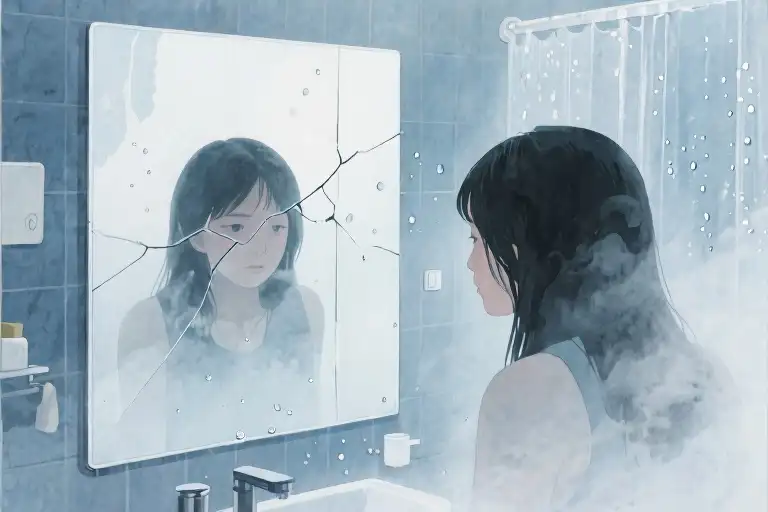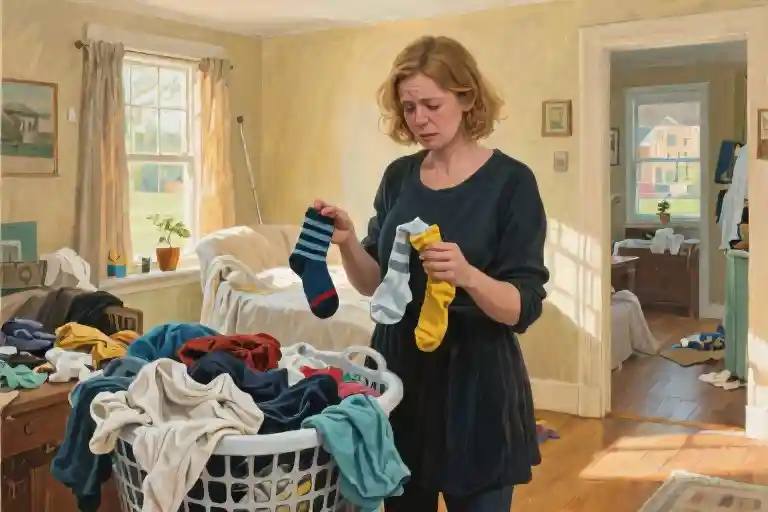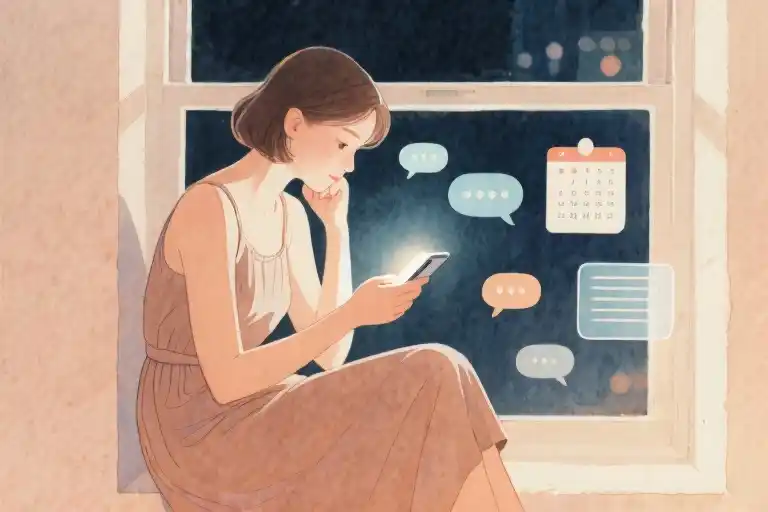The weight of an imaginary sister’s absence sits in my ribs like swallowed moonlight. I’ve spent years constructing her silhouette from fragments – how her hands would feel smoothing my hair after nightmares, the particular tilt of her head when listening to my teenage heartbreaks. But this ghost sister only exists in the conditional tense, in the quiet space between eldest daughter syndrome and the unrelenting reality of being someone’s only hope.
Some nights, when the emotional burden of daughters grows too heavy, I press my palms against the bedroom wall and pretend it’s her shoulder. The plaster stays cool and unyielding. This is the paradox of longing for what you’ve never had – the absence takes on sharper edges than any tangible presence. I’ve become fluent in the art of self-comfort, whispering reassurances to myself in the dark with the cadence I imagine an older sister might use.
There’s a particular loneliness that comes with being the emotional cornerstone of a family. Like standing at the edge of that cliff that opens wide and drowns me, except I’m both the falling and the ground rushing up to meet myself. Psychologists call it emotional labor, this constant scanning of parental moods, this automatic swallowing of personal sorrows because “their sadness must be heavier.” The math never quite adds up – if we all keep minimizing our pain to spare others, where does it actually go?
The first time I recognized this pattern was at fourteen, clutching a failed math test while watching my mother massage her temples after overtime work. My disappointment folded itself into perfect origami, tucked neatly behind my sternum. This is how we learn the silent suffering mental health of Asian households – not through dramatic lectures, but in these microscopic moments of self-erasure.
What no one tells you about being your own sister is how exhausting it is to play both roles. The part of me that needs comfort sits curled in that metaphorical dark cliffside, while the other half whispers platitudes that taste increasingly hollow. Somewhere along the way, I became a stranger to my own voice – not because I had nothing to say, but because years of self-sacrifice in family had turned my throat into a museum of unsent letters.
Yet there’s peculiar strength in this duality. When I catch my reflection unexpectedly – in a subway window, the back of a spoon – I sometimes see her. The sister I’ve been building piece by piece through every self-soothed heartbreak, every silent compromise. She’s not the fantasy I imagined, but she’s real in ways that matter. Her hands are calloused from catching me, her voice raspy from all the words we’re still learning to say aloud.
The Sister That Never Was
The fantasy begins with a question I’ve carried since childhood: What would it feel like to have an older sister? Not just any sister, but one who’d instinctively know when to hand me tissues during silent cries, who’d defend me against the world with that unshakable elder-sibling authority. In my loneliest moments, I’d imagine her sitting at the foot of my bed, brushing my hair while whispering, “Let me handle this.
Reality, of course, plays a different script. As an only child in a traditional Asian household, I became fluent in emotional labor before I learned algebra. By twelve, I could decode my parents’ suppressed sighs after family gatherings, could distinguish between my mother’s “tired” silence and her “disappointed” silence. The Eldest Daughter Syndrome wasn’t just a label—it was the invisible backpack I wore, filled with everyone’s unspoken expectations.
Psychologists call this parentification—when children prematurely assume caretaker roles. But in our culture, it often wears the disguise of filial piety. I remember practicing smiles in the bathroom mirror before dinner, rehearsing cheerful anecdotes to offset my father’s stressful workday. The math seemed simple then: my sadness was divisible; theirs felt like a prime number.
What fascinates me now isn’t the weight itself, but how I learned to distribute it. Like developing muscle memory for emotional weightlifting—left hand holding my parents’ fragile pride, right hand balancing my own unraveling. Some days it felt like wearing a lead apron during dental X-rays: technically protected, but still exposed to something penetrating.
Yet here’s the paradox no one mentions about being your own sister: the loneliness comes with unexpected strengths. When I taught myself to braid hair through YouTube tutorials, when I navigated college applications alone, I was building emotional calluses that now serve as my armor. The girl who once craved someone to lean on became the woman who knows exactly where her own shoulders are strongest.
Perhaps this is the secret grief of only children—we don’t mourn the fights we never had over stolen sweaters or bathroom time, but the lost chance to be the younger one, to temporarily lay down our hyper-vigilance. My imagined sister still visits sometimes, usually during stressful periods. But lately, I’ve noticed something peculiar—when she appears in my daydreams now, she looks suspiciously like my own reflection.
Swallowed Sadness in the Dark
The chopsticks clatter against my bowl like wind chimes in an empty house. At Sunday family dinner, I count the wrinkles around my father’s eyes as he talks about rising grocery prices. My mother’s hands flutter between dishes, her knuckles swollen from decades of kneading dough. I swallow my steamed fish with the bones still in it – the sharp edges scraping my throat feel deserved somehow.
This is how we measure love in my family: by how much pain we can digest for each other. Their sadness sits at the table like an uninvited fourth chair, its weight making the wooden legs creak. When my mother passes me the bitter melon, I take double portions. The acrid taste lingers longer than any compliment I might have received for my new promotion.
Psychologists call this ’emotional labor’, but in our home we call it ‘being considerate’. The math is simple: if I share my bad day, their worry multiplies. So I become an accountant of anguish, always carrying the smaller number. At night, the numbers transform into that cliff from my childhood nightmares – the one where I’m always falling, but the strange comfort is that no one hears me hit the bottom.
There’s a particular science to curling up with broken legs. You learn to distinguish between the sharp pain of fresh fractures and the dull ache of old ones. The darkness here smells like mothballs and unfinished apologies. Sometimes I trace my fingers along the cliff walls and find the grooves where other daughters have carved their names. We leave no dates – our suffering is undifferentiated by generation.
What they don’t tell you about emotional suppression is how physical it becomes. My throat develops its own muscle memory, automatically swallowing words before they reach my tongue. My hands have learned to tremble just enough to excuse my silence. Even my peripheral vision adjusts to watch for approaching storms in my parents’ expressions.
Yet in rare moments, when the household exhales together over trivial things like burnt rice or a broken faucet, I catch glimpses of our shared humanity. My father’s shoulders drop two inches when he laughs at the cat’s antics. My mother’s voice softens when recalling her girlhood cherry tree. These are the fluorescent moss patches in my personal abyss – faint, biological proof that life persists even here.
The cliff isn’t just a metaphor. It’s the exact angle at which my spine curves when nodding to unspoken rules. It’s the echo chamber where my unheard thoughts bounce back as my own voice. Most days, I resent its steep walls. But tonight, as I wash dishes to the soundtrack of my parents’ comfortable silence, I notice something new: these hands that scrub chopstick stains are strong enough to climb.
The Anatomy of Silence
The scolding begins like distant thunder – first a low vibration through the floorboards, then the atmospheric pressure changing in my temples. My mother’s voice takes shape before her words become distinct, that particular pitch that makes my molars ache. I know this script by heart: the way her right hand will grip the kitchen counter, how her left eyebrow arches higher than the right when disappointment outweighs anger. My body responds before my mind, vertebrae locking into place like a medieval chastity belt. This is what psychologists call the freeze response, but in our household, we call it ‘being a good daughter’.
My silence isn’t empty. It’s a crowded room where three generations of women sit knitting their grievances: my grandmother who swallowed her hunger during war times, my aunt who smiled through her husband’s affairs, and now me – the Oxford-educated daughter who still can’t form words when her mother misremembers childhood events. The silence tastes like blood where I’ve bitten my cheek, feels like the slow creep of ice starting at my tailbone. Eldest Daughter Syndrome manifests in these frozen moments – not in what we do, but in what we physically cannot do. The hoarse sound stuck in my throat isn’t just mine; it’s the collective voice of every ‘good Asian girl’ who learned that love means disappearing gracefully.
Cultural neurologists would say my vocal cords are wired to my filial piety center. The moment parental disapproval registers, my larynx becomes a rusted gate. I’ve studied feminist theory, can deconstruct patriarchal structures in three languages, yet when my mother’s eyes narrow at my life choices, my Harvard-trained tongue adheres to the roof of my mouth like a startled gecko. This is the paradox of the silent daughter: we who analyze everything cannot analyze our way out of biological betrayal.
What outsiders mistake for passivity is actually precision demolition. Each unsaid word demolishes a bridge between my present and potential selves. The girl who debated philosophy until dawn becomes someone who counts ceiling cracks during arguments. The woman who writes vulnerable essays transforms into a living secret. In Asian families, silence isn’t absence – it’s the preservation of a delicate ecosystem where parents’ dignity outweighs daughters’ truth.
Yet sometimes, in the suspended animation between my mother’s exhale and my next held breath, I detect fractures in the silence. The way my left pinky twitches like it’s typing an invisible protest. How my suppressed words condense behind my eyes, making everything refract like looking through old glass. These microscopic rebellions go unnoticed, but they’re seismic – proof that even the most obedient silence contains its own undoing. After all, glaciers crack before they calve, and daughters breathe before they speak.
A Fractured Mirror
The bathroom mirror shows a face I’m still learning to recognize. Steam from the shower fogs the glass, and when I wipe it away with my palm, the reflection wavers—just for a second—into someone else. An older version of myself, perhaps. Someone who might have known how to braid hair properly, who could’ve taught me how to handle heartbreak without swallowing it whole.
This is the closest I’ve come to meeting that older sister I used to dream about. She appears in unexpected moments: when I catch myself humming a lullaby to my anxious thoughts at 3 AM, or when I instinctively rub my own back during thunderstorms, the way I imagine a sibling might. These fractured glimpses feel like finding pieces of a mirror buried in the dark—each shard reflecting a version of care I’d stopped expecting from the world.
Psychologists call this ‘reparenting,’ but I prefer to think of it as finally meeting the sister who’d lived in my shadow all along. She emerges when I pack two lunches instead of one on difficult days, leaving the extra portion in the fridge with a sticky note: ‘For you, from you.’ She speaks through the voice recorder on my phone where I’ve saved messages for my future self—reminders that sound suspiciously like the pep talks I’d hoped to receive from an imaginary sibling.
There’s profound loneliness in becoming your own sanctuary, but also an unexpected freedom. The cliff that once threatened to consume me has become familiar terrain. I know its crevices like the lines on my palms, have memorized where the echoes sound warmest when I whisper secrets into the chasm. Some days, I even catch the darkness humming back.
Perhaps this is what survival looks like—not the dramatic rescue I’d fantasized about, but the quiet accumulation of small mercies. Learning to distinguish between the silence of suffocation and the silence of preparation. Discovering that a muted throat can still sing, if only for an audience of one.
When I lean closer to the mirror now, our breath fogging the glass together, I no longer search for missing features. The reflection gazes back with what might be recognition, or maybe just hard-won acceptance. That hoarse voice in my throat? It’s begun to sound less like brokenness and more like the first notes of a duet.





